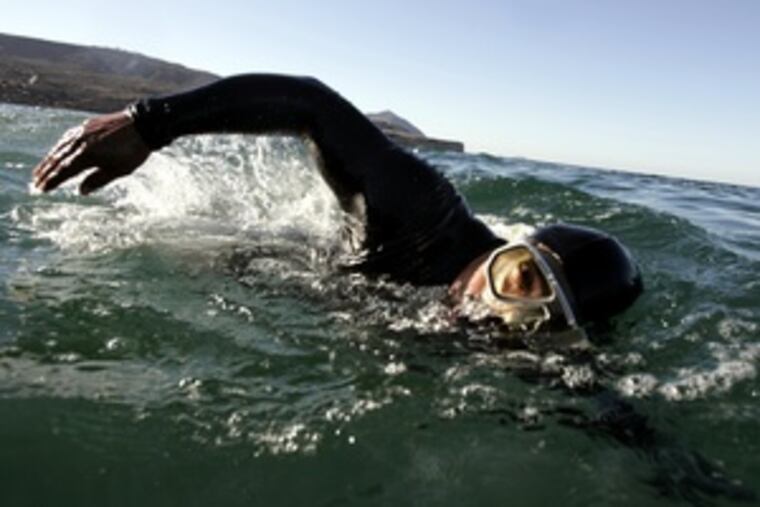
ENSENADA, Mexico - The marathon swimmer churned a solitary path through the chilly current, his wave-sculpted shoulders and arms dragging his lifeless legs through the sea off Baja California.
Thirty years ago, a car accident severed Sergio Valencia's spine, forcing him to use a wheelchair.
Then, the ocean called to him in a dream. In the ocean, a voice told him, you will find freedom.
So Sergio Valencia swam:
From Isla de Todos Santos to Playa Hermosa in Ensenada, becoming the first to cross the 12-mile stretch. Across the Strait of Gibraltar, waving a Mexican flag in triumph as he pulled himself onto a rocky Moroccan beach. Down the Baja California coast for 24 hours straight, with dolphins dancing nearby. He swam these and a dozen other long distances, one after another.
Musicians wrote songs about him. Leaders praised him. Once, he says, he met Cuban President Fidel Castro, who joked that he couldn't let Valencia coach in Havana because everyone would be able to swim to Miami.
Here in his hometown, they hailed him as El Tiburon Negro - the Black Shark, the name he had proudly given himself. Businesses built ramps for his wheelchair, helping spread his message to respect the disabled. The governor awarded him a monthly stipend for his training.
"El Tiburon Ataca de Nuevo" - The Shark Attacks Again - blared a local newspaper headline after one swim.
But that was then.
Now, his trophies, medallions and plaques gather dust inside his tiny apartment in a gang-ridden slum. He supplements his meager income by spearing fish and octopus on his swims. He sells the catches on the streets of this bustling port city, where he drives around in a battered 1991 Cadillac with 275,000 miles on it, using a crutch to prod the gas and brake pedals.
His only regular audience when he swims now are the sea lions and dolphins with which he shares the waters of Bahia de Todos Santos.
"History has passed by El Tiburon," says Ruben Gonzalez Pena, a local businessman who was one of Valencia's first patrons. "He accomplished tremendous feats that normal people could never attain. He was a person with great willpower. Now he's too old. . . . He should set up a stand and sell oranges and peanuts."
Valencia dismisses such talk. He is just 47. Last year he swam the eight-mile stretch from Tijuana to Las Islas Coronado. He has spans yet to cross - Santa Catalina Island to the California mainland, Alcatraz Island to San Francisco, the Bering Strait. He still says he has the strength to conquer them all. What he needs, he says, is a sponsor, which is hard to come by in Mexico.
He could have ended up like many handicapped people, he said, begging for pesos on a street corner. Instead, he became an inspiration and role model - and should not be forgotten.
In a rich country like the United States, Valencia can't help thinking, he would have a more dignified life, with a decent apartment, perhaps a coaching job.
In America, he says, people honor his exploits. Last year, he was nominated for the Hall of Fame of the National Spinal Cord Injury Association in Maryland.
"I don't want handouts. I demand only what I deserve. . . . That's what they don't understand," he said of his countrymen. "But they would understand if they saw the risks I take and the dangers I face."
The sea has given Valencia so much, he thinks it may have more to offer him.
He still finds a way to eke out a living and squeeze joy out of life. He and his 15-year-old son get by on a $340 monthly government pension. Spearing fish fetches a few extra dollars.
Valencia courts his girlfriend, Nancy Conroy, a blond American, by wearing his long leg braces - fitted with cowboy boots - and hopping up three flights of stairs to her apartment. It takes him seven minutes of huffing, puffing and sweating. When she opened the door once, he gave her a bouquet of roses.
"He's got the biggest heart in the world. It's impossible to know him without being affected by him," said Conroy, the publisher of the local English-language newspaper, the Gringo Gazette.
Valencia still swims at the beach outside Ensenada, where local fishermen carry him into the water. When no one can help, he drags himself into the sea.
At night he dreams. But he says the ocean doesn't need to call him anymore. He has swum hundreds of miles, in the hope of taking one step.
"In my dreams now," he said, "I'm always walking, with my girlfriend in one hand, and my son in the other."